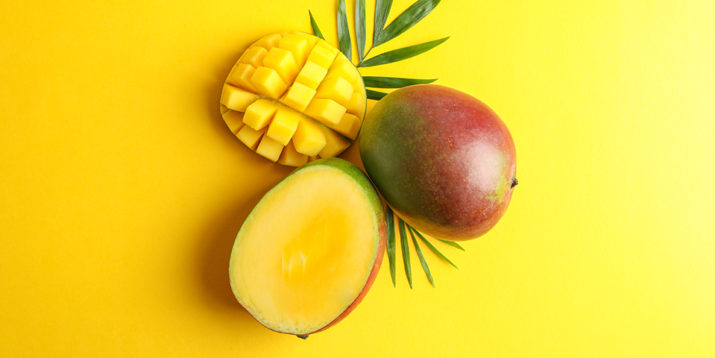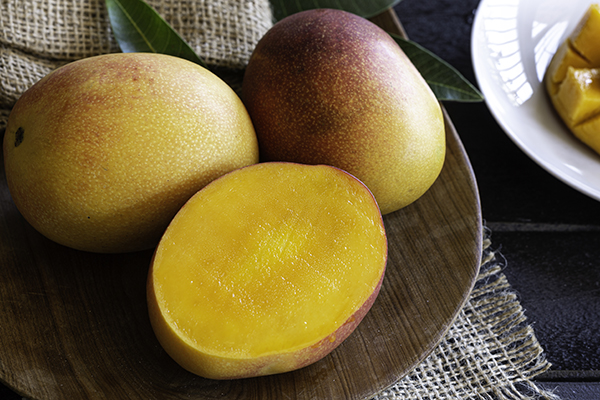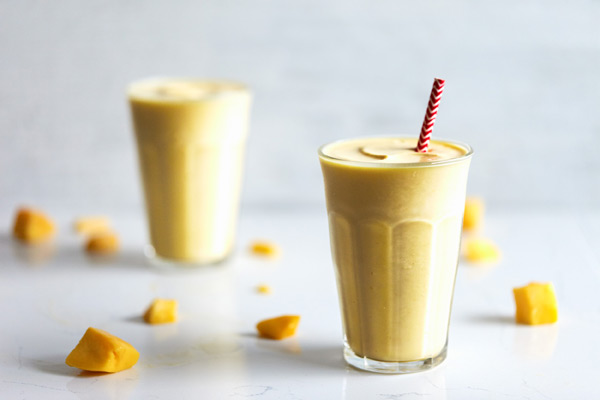Everything You Wanted to Know About Mangoes

Mangoes are sweet, tropical, and ripe with health benefits. Read on to get the 411 on mango nutrition and perks, plus, the best ways to enjoy this bright fruit.
Mango Nutrition Facts
Like many fruits, mangoes are relatively low in calories, yet chock-full of vitamins, fiber, and other nutrients.
Per estimates from the U.S. Department of Agriculture, a single cup of mango chunks provides:
- Calories: 99
- Protein: 1 gram
- Fat: 1 g
- Carbs: 25 g
- Fiber: 3 g
- Vitamin C: 60 milligrams, or 80% of the Recommended Dietary Allowance for women ages 31-50 and 66% of the RDA for men ages 31-50
- Vitamin A: 89 micrograms, nearly 13% of the RDA for women ages 31-50 and nearly 10% of the RDA for men ages 31-50
- Potassium: 277 mg, nearly 11% of RDA for women ages 31-50 and about 8% of the RDA for men ages 31-50
- Folate: 71 mcg, nearly 18% of RDA for both men and women ages 31-50.
Mango Benefits

Here are a few compelling reasons to include mango in your diet.
1. Contains antioxidant-like compounds
“Mangoes are packed with phytochemicals” and antioxidant-like compounds, including carotenoids that give mangoes their bright yellow and orange color, says Nicole Stefanow, M.S., R.D.N., a culinary nutritionist from New York City.
2. A good source of fiber
Each cup of mango contains 3 grams of dietary fiber, which is beneficial for digestive health and other aspects of your well-being. Most U.S. adults fall short of their daily fiber goal, so every little bit helps!
3. An excellent source of vitamin C
Move over, oranges! Mango is offering some competition when it comes to vitamin C, delivering two-thirds of what adults need in a day. If you want to change up your routine, their sweet flavor pairs well just about anywhere you would usually use oranges.
4. A good source of folate
Mangoes are also a good source of folate, another essential vitamin that’s especially beneficial before and during pregnancy (because folate it prevents neural tube defects in developing fetuses).
5. May support digestive health
Mango has a lot to offer your digestive health. For starters, mangoes contain a group of digestive enzymes called amylases, which break down large food molecules so they’re more easily absorbed by your body.
“These enzymes are more active in ripe mangoes, which is why they’re sweeter than unripe ones,” says Harland Adkins, R.D.N.
How to Eat Mango
The easiest way to eat mango is to slice it up and snack away.
“However, it can be difficult to cut, due to its tough skin and large pit,” Adkins says.
Start with a ripe mango — you’ll be able to tell it’s ripe if you can press your finger into the flesh. Adkins offers these steps:
- Cut long vertical slices ¼-inch from the pit to separate the flesh.
- Next, cut the flesh into a grid-like pattern and scoop it out.
- Enjoy!
Mango Recipes

If you can’t get enough mango, there are plenty more creative recipes that highlight mango.
Here are a few ideas to get you started:
- Blend frozen mango chunks into a smoothie (Stefanow recommends combining with pineapple and basil).
- Whip up our grilled mango chicken skewers recipe.
- Add diced mango to salsas.
- Toss mango slices into summer salads.
- Swap in thawed frozen mango for fresh if that’s more convenient for you!
- Layer fresh mango cubes with Greek yogurt and a sprinkle of granola.
- Blend fresh mango into salad dressings.
